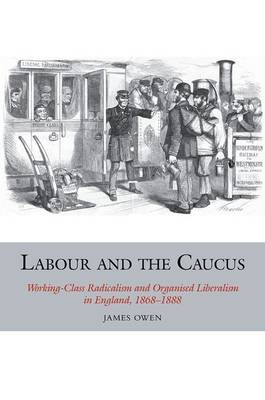
- Afhalen na 1 uur in een winkel met voorraad
- Gratis thuislevering in België vanaf € 30
- Ruim aanbod met 7 miljoen producten
- Afhalen na 1 uur in een winkel met voorraad
- Gratis thuislevering in België vanaf € 30
- Ruim aanbod met 7 miljoen producten
Zoeken
Labour and the Caucus
Working-Class Radicalism and Organised Liberalism in England, 1868-1888
James Owen
€ 183,95
+ 367 punten
Uitvoering
Omschrijving
Labour and the Caucus provides a new, innovative pre-history of the Labour party. In the two decades following the Second Reform Act there was a sustained and concerted campaign for working-class parliamentary representation from a range of labour organisations to an extent that was hitherto unseen in British political history. The franchise revolution of 1867 and the controversial introduction of more sophisticated forms of electoral machinery, which became known as the 'caucus', raised serious questions not only for a labour movement seeking to secure political representation but also for a Liberal party that had to respond to the pressures of mass politics. Through a close examination of the interactions between labour and the 'caucus' from the 1868 general election to Keir Hardie's independent labour candidature in 1888, this book provides a comprehensive and multi-layered picture of the troubled relationship between working-class radicals and organised Liberalism. The electoral strategy of labour candidates, the links between urban and rural radicalism, the impact of the National Liberal Federation, the influence of American and Irish politics on the labour movement, the revival of socialism, and the contested identity of a 'Labour party' are all examined from fresh perspectives. In doing so, this book challenges the existing teleological assumptions about the rise of independent labour, and explores the questions that remain about how working-class radicals and Liberals shared and negotiated power, and how this relationship changed over time.
Specificaties
Betrokkenen
- Auteur(s):
- Uitgeverij:
Inhoud
- Aantal bladzijden:
- 255
- Taal:
- Engels
- Reeks:
- Reeksnummer:
- nr. 3
Eigenschappen
- Productcode (EAN):
- 9781846319440
- Verschijningsdatum:
- 17/02/2014
- Uitvoering:
- Hardcover
- Formaat:
- Genaaid
- Afmetingen:
- 163 mm x 236 mm
- Gewicht:
- 498 g

Alleen bij Standaard Boekhandel
+ 367 punten op je klantenkaart van Standaard Boekhandel
Beoordelingen
We publiceren alleen reviews die voldoen aan de voorwaarden voor reviews. Bekijk onze voorwaarden voor reviews.











